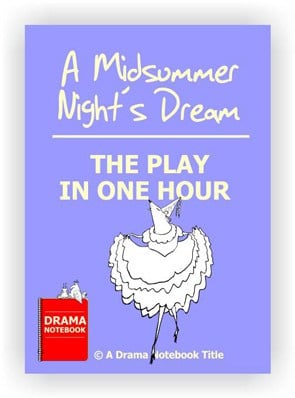For ages 12 and up
Do you want to put on a Shakespeare production, but absolutely cannot perform the entire play? This abridged version of ‘A Midsummer Night’s Dream’ was professionally edited by a The author of Drama Notebook.
Similar versions of abridged Shakespeare plays sell for $15 to $100 or more (depending on performance royalties)! On Drama Notebook, it is part of your membership and there are no royalties if there is no admission for performance.
Excerpt from the play:
DRAMATIS PERSONAE
THESEUS-Duke of Athens
EGEUS-Father to Hermia
LYSANDER-In love with Hermia
DEMETRIUS-In love with Hermia
PHILOSTRATE-Master of the revels to Theseus
QUINCE-A carpenter
SNUG-A joiner
BOTTOM-A weaver
FLUTE-A bellows maker
SNOUT-A tinker
STARVELING-A tailor
HIPPOLYTA-Queen of the Amazons,betrothed to Theseus
HERMIA-Daughter to Egeus, in love with Lysander
HELENA-In love with Demetrius
OBERON-King of the fairies
TITANIA-Queen of the fairies
PUCK-Or Robin Goodfellow
PEASEBLOSSOM-Fairy
COBWEB– Fairy
MOTH– Fairy
MUSTARDSEED– Fairy
Act One
Athens, and a wood near it.
Scene One
Athens. The palace of THESEUS.
(Enter THESEUS and HIPPOLYTA)
THESEUS
Now, fair Hippolyta, our nuptial hour
Draws on apace; four happy days bring in
Another moon: but, O, methinks, how slow
This old moon wanes! She lingers my desires,
Like to a step-dame, or a dowager,
Long withering out a young man’s revenue.
HIPPOLYTA
Four days will quickly steep themselves in night;
Four nights will quickly dream away the time;
And then the heaven, shall behold the night Of our solemnities.
THESEUS
Hippolyta, I woo’dthee with my sword,
And won thy love doing thee injuries;
But I will wed thee in another key, With pomp, with triumph and with revelling.
(Enter EGEUS, HERMIA, LYSANDER, and DEMETRIUS)
EGEUS
Happy be Theseus, our renowned duke!
THESEUS
Thanks, good Egeus: what’s the news with thee?
EGEUS
Full of vexation come I, with complaint
Against my child, my daughter Hermia.
Stand forth, Demetrius. My noble lord,
This man hath my consent to marry her.
Stand forth, Lysander: and my gracious duke,
This man hath bewitch’d the bosom of my child;
Thou, thou, Lysander, thou hast given her rhymes,
And interchanged love-tokens with my child:
Thou hast by moonlight at her window sung,
Withgawds, conceits, Knacks, trifles, nosegays, sweetmeats, messengers Of strong prevailment in unharden’dyouth:
With cunning hastthou filch’d my daughter’s heart,
Turn’d her obedience, which is due to me,
To stubborn harshness: and, my gracious duke,
Be it so she will not here before your grace
Consent to marry with Demetrius.
I beg the ancient privilege of Athens –
As she is mine, I may dispose of her:
Which shall be either to this gentleman Or to her death.
THESEUS
What say you, Hermia? be advised fair maid:
To you your father should be as a god.
Demetrius is a worthy gentleman.
HERMIA
So is Lysander.
THESEUS
In himself he is;
But in this kind, wanting your father’s voice,
The other must be held the worthier.
HERMIA
I would my father look’dbut with my eyes.
THESEUS
Rather your eyes must with his judgment look.
HERMIA
I do entreat your grace to pardon me.
I know not by what power I am made bold,
But I beseech your grace that I may know
The worst that may befall me in this case,
If I refuse to wed Demetrius.
THESEUS
Either to die the death or to abjure
For everthe society of men.
Therefore, fair Hermia, question your desires;
Whether, if you yield not to your father’s choice,
You can endure the livery of a nun.
HERMIA
Ere I will my virgin patent up.
THESEUS
Take time to pause; and, by the next new moon–
The sealing-day betwixt my love and me,
For everlasting bond of fellowship–
Upon that day either prepare to die
For disobedience to your father’s will,
Or else to wed Demetrius.
DEMETRIUS
Relent, sweet Hermia: and, Lysander, yield
Thy crazed title to my certain right.
LYSANDER
You have her father’s love, Demetrius;
Let me have Hermia’s: do you marry him.
EGEUS
Scornful Lysander! true, he hath my love,
And what is mine my love shall render him.
And she is mine,and all my right of her
I do estate unto Demetrius.
LYSANDER
I am, my lord, as well derived as he,
As well possess’d; my love is more than his;
My fortunes every way as fairly rank’d
I am beloved of beauteous Hermia:
Why should not I then prosecute my right?
Demetrius, I’ll avouch it to his head,
Made love to Nedar’s daughter, Helena,
And won her soul; and she, sweet lady, dotes,
Devoutly dotes, dotes in idolatry,
Upon this spotted and inconstant man.
THESEUS
I must confess that I have heard so much
My mind did lose it. But Demetrius, come;
And come, Egeus; you shall go with me,
I have some private schooling for you both.
For you, fair Hermia, look you arm yourself
To fit your fancies to your father’s will;
Or else the law of Athens yields you up—
Which by no means we may extenuate—
To death, or to a vow of single life.
Come, my Hippolyta.
EGEUS
With duty and desire we follow you.
(Exit all but LYSANDER and HERMIA)
LYSANDER
How now, my love! why is your cheek so pale?
How chance the roses there do fade so fast?
HERMIA
Belike for want of rain, which I could well
Beteem them from the tempest of my eyes.
LYSANDER
Ay me! for aught that I could ever read,
Could ever hear by tale or history,
The course of true love never did run smooth.
HERMIA
If then true lovers have been ever cross’d
It stands as an edict in destiny:
Then let us teach our trial patience.
Because it is a customary cross,
As due to love as thoughts and dreams and sighs,
Wishes and tears, poor fancy’s followers.
LYSANDER
A good persuasion: therefore, hear me, Hermia.
I have a widow aunt, a dowager
Of great revenue, and she hath no child:
From Athens is her house remote seven leagues.
There, gentle Hermia, may I marry thee;
And to that place the sharp Athenian law
Cannot pursue us. If thou lovest me then,
Steal forth thy father’s house to-morrow night;
And in the wood, a league without the town,
There will I stay for thee.
HERMIA
My good Lysander!
I swear to thee, by Cupid’s strongest bow,
In that same place thou hast appointed me,
To-morrow truly will I meet with thee.
LYSANDER
Keep promise, love. Look, here comes Helena.
(Enter HELENA)
HERMIA
God speed fair Helena! whither away?
HELENA
Call you me fair? that fair again unsay.
Demetrius loves your fair: O happy fair!
O, teach me how you look, and with what art
You sway the motion of Demetrius’ heart.
HERMIA
I frown upon him, yet he loves me still.
HELENA
O that your frowns would teach my smiles such skill!
HERMIA
I give him curses, yet he gives me love.
HELENA
O that my prayers could such affection move!
HERMIA
The more I hate, the more he follows me.
HELENA
The more I love, the more he hateth me.
HERMIA
His folly, Helena, is no fault of mine.
HELENA
None, but your beauty: would that fault were mine!
HERMIA
Take comfort: he no more shall see my face;
Lysander and myself will fly this place.
LYSANDER
Helen, to you our minds we will unfold:
Her silver visage in the watery glass,
Decking with liquid pearl the bladed grass,
A time that lovers’ flights doth still conceal,
Through Athens’ gates have we devised to steal.
HERMIA
And in the wood, where often you and I
Upon faint primrose-beds were wont to lie,
Keep word, Lysander: we must starve our sight
From lovers’ food till morrow deep midnight.
LYSANDER
I will, my Hermia.
(Exit HERMIA)
Helena, adieu:
As you on him, Demetrius dote on you!
(Exit Lysander)
HELENA
How happy some o’er other some can be!
Through AthensI am thought as fair as she.
But what of that? Demetrius thinks not so;
He will not know what all but he do know:
Love looks not with the eyes, but with the mind;
And therefore is wing’d Cupid painted blind:
For ere Demetrius look’d on Hermia’s ,
He hail’d down oaths that he was only mine;
And when this hail some heat from Hermia felt,
So he dissolved, and showers of oaths did melt.
I will go tell him of fair Hermia’s flight:
Then to the wood will he to-morrow night
Pursue her; and this intelligence
If I have thanks, it is a dear expense:
But herein mean I to enrich my pain,
To have his sight thither and back again.
(Exit Helena)
Scene Two
The same. QUINCE’S house.
(Enter QUINCE, SNUG, BOTTOM, FLUTE, SNOUT, and STARVELING)
QUINCE
Is all our company here?
BOTTOM
You were best to call them generally, man by man,
according to the scrip.
QUINCE
Here is the scroll of every man’s name, which is
thought fit, through all Athens, to play in our
interlude before the duke and the duchess, on his
wedding-day at night.
BOTTOM
First, good Peter Quince, say what the play treats
on, then read the names of the actors, and so grow
to a point.
QUINCE
Marry, our play is, The most lamentable comedy, and
most cruel death of Pyramus and Thisby.
Why Subscribe?
 Inside Drama Notebook, you will find a huge collection of well-organized lesson plans, scripts for kids, drama activities, 50 drama games on video and more! Join today and dramatically reduce your planning time while delivering fresh, innovative drama lessons to your students! If you are new to teaching drama, this site will be a Godsend! You will immediately feel confident about teaching drama like an expert. The site guides you step-by-step and provides you with materials that you can use right away with your students.
Inside Drama Notebook, you will find a huge collection of well-organized lesson plans, scripts for kids, drama activities, 50 drama games on video and more! Join today and dramatically reduce your planning time while delivering fresh, innovative drama lessons to your students! If you are new to teaching drama, this site will be a Godsend! You will immediately feel confident about teaching drama like an expert. The site guides you step-by-step and provides you with materials that you can use right away with your students.
If you have been teaching for years, Drama Notebook will inspire you with a fresh new approach and innovative ideas!
The site is packed with original, innovative lessons and activities that you will not find anywhere else—and new materials are added monthly.
This site is protected by reCAPTCHA and the Google Privacy Policy and Terms of Service apply.


















